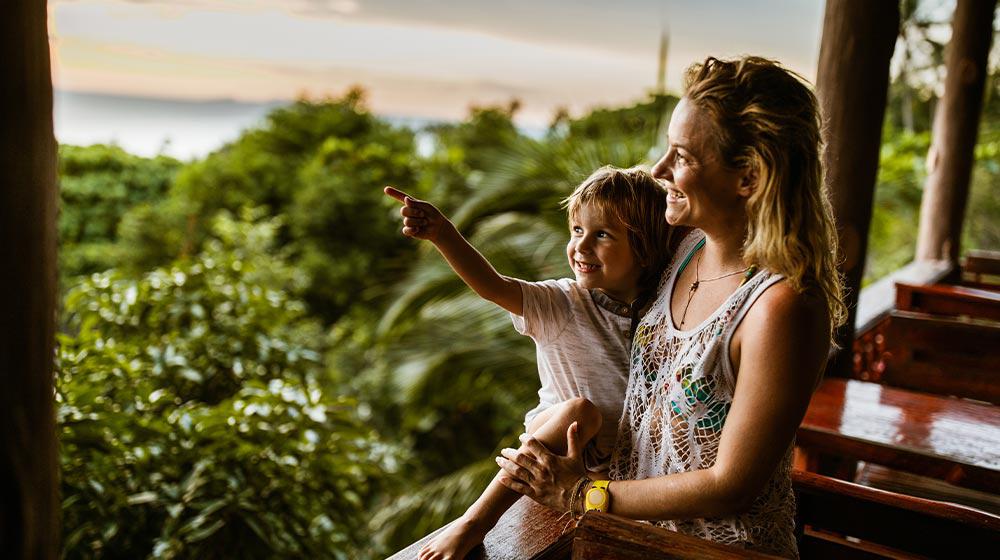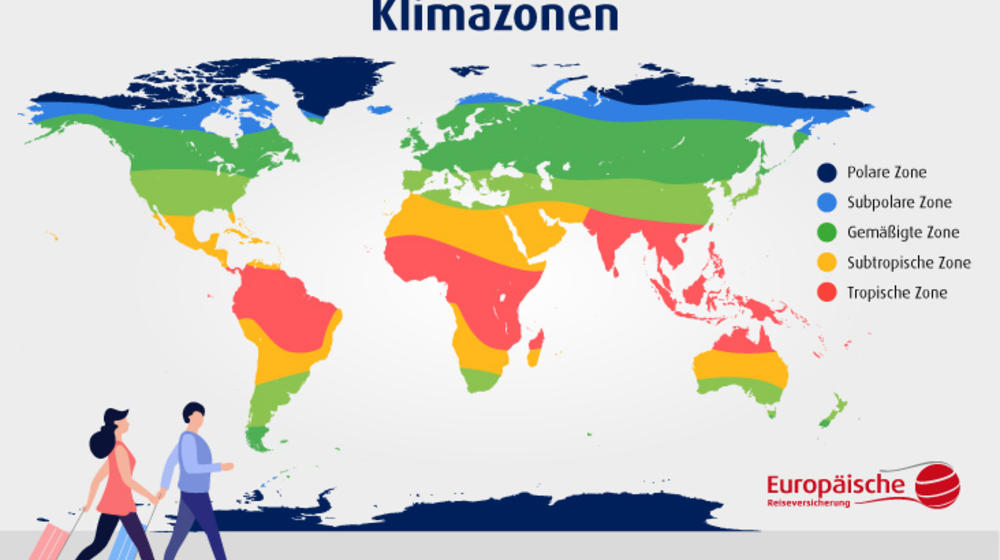The tropics fascinate with exotic nature, paradisiacal beaches and exciting adventures. However, in addition to the breathtaking landscapes and cultural treasures, there are also health risks that long-distance travelers should be aware of. For example, the danger of tropical diseases, which are caused by various pathogens such as viruses, bacteria and parasites and can have serious health consequences.
This guide provides you with comprehensive information about tropical diseases: Which risk areas there are, which symptoms you should look out for and how you can protect yourself from infection with vaccinations and precautionary measures. With the right preparation, you can enjoy your vacation in the tropics safely and worry-free.
Risk areas for tropical diseases
The tropics lie north and south of the equator and include countries such as Thailand, Indonesia, Vietnam, Brazil and Kenya. The subtropics lie between the tropics and the warm temperate zone. They include some Asian countries as well as parts of Africa and Australia.
At the end of this article you will find an overview of the risk areas and the tropical diseases that are common there. Please note that the distribution areas of tropical diseases can change rapidly.
Africa
- Malaria
- Yellow fever
- African trypanosomiasis (sleeping sickness)
South and Central America
- Malaria
- Dengue fever
- Zika virus diseases
Southeast Asia
- Dengue fever
- Malaria
- Chikungunya fever
Certain parts of Oceania
- Dengue fever
- Zika virus diseases
Our tip: Before you travel, find out about current travel medical advice for your vacation destination from the Ministry of Foreign Affairs or tropical medicine institutes.
What are tropical diseases?
Tropical diseases are infectious diseases that mainly occur in tropical and subtropical regions. They are caused by various pathogens:
- Bacteria (e.g. typhoid fever)
- Single-celled organisms (e.g. malaria)
- Worms (e.g. schistosomiasis)
- Viruses (e.g. dengue fever)
The spread of tropical diseases is facilitated by climatic conditions and environmental factors. Poverty, poor hygiene, a lack of sanitary facilities, poor access to clean drinking water and limited healthcare also contribute to the spread of tropical diseases.
The good news is that you can protect yourself against tropical diseases. Vaccinations, medication and the right behavior are suitable measures to prevent infections caused by parasites, viruses and bacteria. In the following sections, we provide information and advice on what you can do to take preventative measures.
Common tropical diseases
There are over 200 known infectious diseases in total. Below we present some of the most common tropical diseases, including transmission routes and typical symptoms:
- Malaria: Malaria is transmitted by infected mosquitoes and occurs mainly in the tropics and subtropics. The symptoms are similar to flu: aching limbs and headaches, fever, sometimes also diarrhea and vomiting.
- Dengue fever: The dengue virus is transmitted by mosquito bites and causes dengue fever. Symptoms include fever, muscle pain and skin rash.
- Zika virus: The Zika virus is usually transmitted by mosquitoes, less frequently through blood transfusions or sexual contact. The Zika virus is particularly dangerous for pregnant women, as it can lead to malformations in newborn babies. Symptoms include fever, headache and aching limbs, skin rash and red eyes.
- Chikungunya: This viral disease is also transmitted by mosquito bites. Symptoms include fever, joint pain, skin rash and muscle pain.
- Yellow fever: Yellow fever is a serious viral infection that is also transmitted by mosquitoes. Symptoms include fever, headache, nausea and muscle pain, often accompanied by conjunctivitis.
- Typhoid fever: Typhoid fever is a bacterial infection caused by contaminated water or food. Symptoms of typhoid fever are high fever, headache, abdominal pain and diarrhea.
- Leishmaniasis: This parasitic disease is transmitted by the bite of sandflies. There are various forms of leishmaniasis, ranging from skin lesions to severe infestation of the internal organs. Symptoms include fever, weight loss, vomiting and diarrhea.
- Schistosomiasis: This worm disease is transmitted through contact with infected fresh water. Signs of the disease include fever, cough, abdominal pain and blood in the urine or stool.
- African trypanosomiasis (sleeping sickness): Sleeping sickness is transmitted by the tsetse fly, which is mainly found in rivers and swamps. The symptoms vary depending on the stage of the disease and take the form of fever, weakness, headaches, severe damage to the nervous system and sleep disorders.
Typical symptoms of tropical diseases
The symptoms of tropical diseases vary depending on the disease. However, some signs are typical warning signals:
- Fever
- Headache
- Joint pain
- Muscle pain
- Nausea
- Vomiting
- Diarrhea
- Skin rashes
With some tropical diseases, such as malaria, the symptoms occur at regular intervals, while other diseases come on suddenly and severely. If you notice one or more symptoms and have been to a risk area, be sure to consult a doctor.
Our tip: Monitor the course of the disease closely. Many tropical diseases only break out weeks or months after infection. You may have long since left the tropics and no longer associate the symptoms with your trip. However, this information is particularly important for correct medical treatment.
Vaccinations against tropical diseases
One of the most important measures against tropical diseases is vaccination. The National Vaccination Committee gives specific vaccination recommendations depending on the destination. However, there are no vaccinations for some tropical diseases such as dengue fever or Zika virus diseases. In high-risk countries, it is therefore particularly important to protect yourself against mosquito bites. You can read more about this in the section “Precautionary measures and rules of conduct”.
The following applies to vaccinations: Personal travel medical advice is essential. You should therefore make an appointment with a doctor of general medicine, travel medicine or tropical medicine in good time before any trip to the tropics and bring your vaccination certificate with you.
Which vaccinations against tropical diseases are available?
The Austrian Vaccination Commission (ÖIK) recommends vaccinations against the following diseases when traveling to risk areas:
- Cholera
- TBE (tick-borne encephalitis)
- Yellow fever
- Hepatitis A/B
- Influenza
- Meningococcal
- Polio (polio)
- Rabies
- Typhoid
Please note, however, that the infection situation can change quickly.
Our tip: Whether and how you get vaccinated also depends on your personal state of health. You should therefore always seek personal advice at your doctor's surgery.
Precautionary measures and rules of conduct: 7 helpful tips
Not all tropical diseases can be prevented by vaccinations. You can significantly reduce your risk of infection with these 7 tips:
- Wear protective clothing: Wear long-sleeved shirts, long pants and closed shoes. This will reduce the risk of infections transmitted by insect bites.
- Use insect repellent: Choose a high-quality insect repellent that contains DEET (diethyltoluamide) or a similarly effective repellent. Spread it liberally on uncovered skin to reduce the risk of being bitten by mosquitoes.
- Cook your food: Many travelers suffer from gastrointestinal complaints or diarrhea during a long-distance trip. The most common reason for this is that you have eaten raw or undercooked food. By peeling and cooking your food before eating and avoiding raw food, you protect yourself from gastrointestinal illnesses and diseases caused by parasites.
- Don't drink tap water: Clean drinking water is just as important as well-cooked food. Therefore, do not drink tap water, but buy packaged drinking water instead. It is also better to use clean, packaged water when brushing your teeth.
- Beware of bodies of water: In the tropics and subtropics, you should be particularly careful around open bodies of water. People are usually afraid of encountering crocodiles, snakes or hippos there. However, the fear of infection from contaminated water is not very great for most people - and wrongly so. Therefore, find out exactly whether lakes, rivers or other bodies of water are really safe before you go in.
- Use a mosquito net: Sleep under a mosquito net to avoid mosquito bites during the night. The mosquito net should be as large as possible, with meshes smaller than the smallest local mosquito. In yellow fever, dengue or malaria risk areas, the World Health Organization (WHO) even recommends impregnated nets.
- Close doors and windows: Keep doors and windows closed for as long as possible to keep mosquitoes away from indoor areas. This is especially important when you leave your accommodation or go to sleep.
Download or print out our practical checklist “Tropical diseases - precautions and rules of conduct” here.
Prevent tropical diseases with medication
In addition to vaccinations and rules of conduct, you can also prevent tropical diseases with medication. And thus reduce the risk of infection with a tropical disease. In the case of tropical diseases, medical precautions are particularly important in malaria regions. Many people take medication as a preventative measure, in some cases even before they travel. This is because it can weaken or even prevent the effects of the disease. In other cases, it makes sense to take an emergency medication with you: For example, if you have malaria and there is no doctor's surgery or clinic within easy reach. Please note, however, that medication for malaria prevention is only available on prescription, so you will need a doctor's prescription.
Even if you are taking medication to prevent an infection, the following applies: find out about common pathogens and the recommended precautionary measures for your destination in good time before you travel. Seek travel medical advice: on individual risks, current developments and necessary protective measures.
Travel safely to the tropics with travel insurance
Tropical diseases pose a serious health risk when traveling to tropical and subtropical regions. To reduce the risk of infection, find out about the necessary precautions at your doctor's surgery or from the relevant health authority.
Should you contract a tropical disease despite taking all the necessary precautions, you are well covered with comprehensive cover from Europäische Reiseversicherung. We are there for you around the clock and cover the costs of your medical treatment. We will also reimburse your travel costs if you have to cancel your trip or break it off prematurely.



